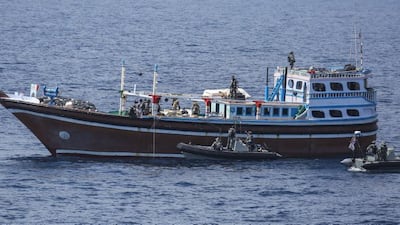A UN panel of experts has called for a stricter checks to prevent arms smuggling arms into Yemen and for United Nations observers in Hodeidah to share information on acts that “threaten the peace, stability and security” of the war-torn country.
The recommendations are among nine made by the experts monitoring sanctions against Yemen in their latest report to the Security Council, a copy of which was seen by Associated Press.
The report was submitted as UN monitors in Yemen try to implement a ceasefire agreement in the port city of Hodeidah and arrange the withdrawal of government forces and the Iran-backed Houthi rebels from the area.
Hodeidah's rebel-held ports handle about 70 per cent of Yemen's food and aid imports. However, the Hodeidah truce, agreed during talks in Sweden last month, has yet to be implemented and suffered a setback on Thursday when a convoy carrying the head of the UN monitors was shot at after a meeting with government representatives in Hodeidah.
The government and the allied Saudi-led Arab military coalition have reported hundreds of rebel violations since the ceasefire took effect on December 18.
While the agreement in Stockholm was limited, if fully implemented it could offer a potential breakthrough in Yemen's four-year civil war that has brought the Arab world's poorest country to the brink of starvation and created the world's worst humanitarian crisis.
The Saudi-led Arab military coalition supporting the government accuses the rebels of using the ports to smuggle in weapons. UN and independent investigations have traced the origins of mines, drones and missiles used by the rebels to Iran.
The UN experts panel asked the Security Council committee monitoring sanctions against Yemen to engage with Secretary General Antonio Guterres's office, Yemen's government and donors to "enhance" the UN mission inspecting vessels heading to ports in Yemen for illegal arms so it can "identify networks using false documentation to evade inspection".
They also suggested that Mr Guterres organise a conference with the International Monetary Fund and World Bank as well as other "key actors to best manage cash flows and imports of goods”, using the principles of the U.N. Global Compact on how companies should conduct business.
The experts also recommended that Mr Guterres ask the UN monitors in Hodeidah "to share information on potential cases of acts that threaten the peace, stability and security of Yemen", including violations of international human rights and humanitarian law, the UN arms embargo, and obstructions of humanitarian assistance.
They asked the council to urge the Houthi rebels to respect the neutrality and independence of humanitarian workers, and to remind the government of its obligations under international law to provide adequate standards of living for its citizens, including ensuring entry of goods into the country, especially desperately needed food.
_______________
Read more:
UN expands Hodeidah ceasefire monitoring mission
Senior Houthi official defects and flees to Aden
_______________
The experts also asked the sanctions committee to consider sending three letters.
One would be to alert the International Maritime Organisation to "the risks posed by anti-ship cruise missiles and water-borne improvised explosive devices in the Red Sea and to encourage it to discuss these threats with the commercial shipping industry with the aim of developing suitable precautions and countermeasures".
The second would be to alert the International Civil Aviation Organisation of the risks posed by drones and munitions to civil aviation, particularly near busy international airports on the Arabian Peninsula "and encourage it to discuss these threats with airport operators and airlines with the aim of developing suitable precautions and countermeasures".
The third letter would be to Abu Al Abbas, a militia commander in the flashpoint city of Taez, asking him to transfer artefacts and items from the Taez National Museum in his custody to Yemen's government.

